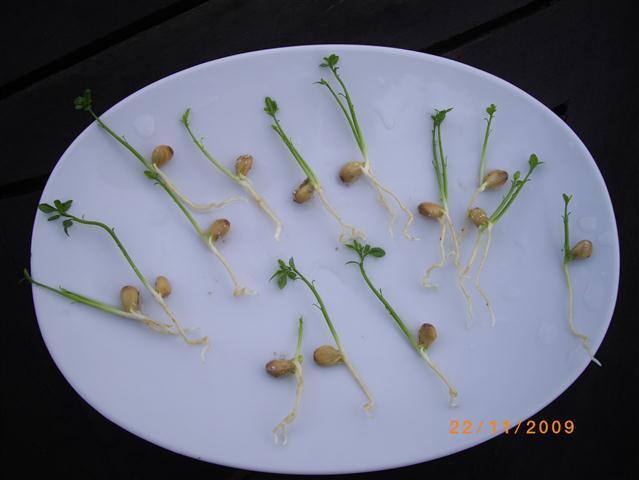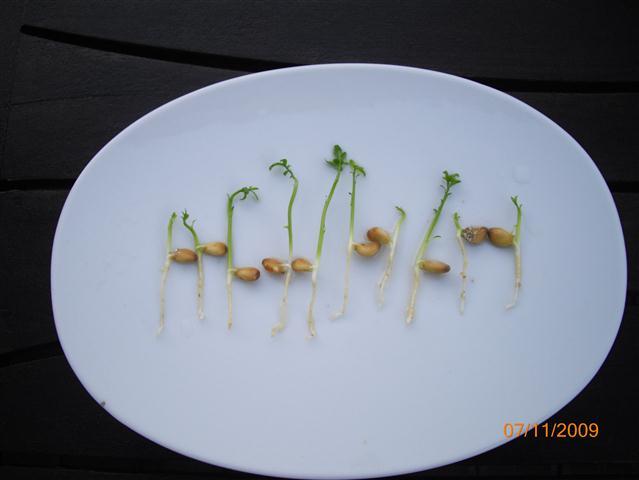| Author |
Message |
GregMartin
Citruholic

Joined: 12 Jan 2011
Posts: 268
Location: southern Maine, zone 5/6
|
| Posted: Wed 12 Jan, 2011 7:33 pm |
|
Hi, I'd like to grow Poncirus x Citrus hybrids in a greenhouse with an eye towards crossing them with each other to produce seed. I live in New England and would like to try growing the resulting seeds outside to see if any of the resulting plants has Poncirus like hardiness. Biggest concern is identifying those hybrids available that produce zygotic seedlings a decent percent of the time versus just producing nucellar seedlings. I'd like to produce lots of seed, let the winter take out the nucellar seedlings and non-hardy F2's and start to develope a genepool of hardier hybrids to work from.
Anyone have or know where to get any of this information? I read the following online:
"From open pollination of fifty-six recent F1 hybrids between four varieties of Citrus and Poncirus trifoliata (Cameron and Baines, unpublished) mainly zygotic seedlings were obtained from forty-three, and mainly apparent nucellar seedlings were obtained from thirteen others."
Love to find out what the best stock to work with is. Are there already (Poncirus x Citrus) x (Poncirus x Citrus) plants available that have been screened for Poncirus like hardiness? |
|
| Back to top |
|
 |
Millet
Citruholic


Joined: 13 Nov 2005
Posts: 6657
Location: Colorado
|
| Posted: Wed 12 Jan, 2011 8:02 pm |
|
The Southeastern Palm Society, has done a lot of work concerning citrus varieties and their hardiness. Especially, a member named Tom McClendon. In fact they have published a booklet titled, "Hardy Citrus For The Southeast", with information on Trifoliate Orange, Cit ranges, Citrumelos, Citrandarins, Citrangequats, Ichange Papeda, Ichange Lemon, Yuzu, Clem-Yuzu, Yuzuquat, Yuzvage, Kumquats, Procimequat, Nippon Orangequat, and on and on. The Society has a web site where you should find information. - Millet (733-) |
|
| Back to top |
|
 |
mrtexas
Citruholic


Joined: 02 Dec 2005
Posts: 1029
Location: 9a Missouri City,TX
|
| Posted: Thu 13 Jan, 2011 12:53 am |
|
| GregMartin wrote: | Hi, I'd like to grow Poncirus x Citrus hybrids in a greenhouse with an eye towards crossing them with each other to produce seed. I live in New England and would like to try growing the resulting seeds outside to see if any of the resulting plants has Poncirus like hardiness. Biggest concern is identifying those hybrids available that produce zygotic seedlings a decent percent of the time versus just producing nucellar seedlings. I'd like to produce lots of seed, let the winter take out the nucellar seedlings and non-hardy F2's and start to develope a genepool of hardier hybrids to work from.
Anyone have or know where to get any of this information? I read the following online:
"From open pollination of fifty-six recent F1 hybrids between four varieties of Citrus and Poncirus trifoliata (Cameron and Baines, unpublished) mainly zygotic seedlings were obtained from forty-three, and mainly apparent nucellar seedlings were obtained from thirteen others."
Love to find out what the best stock to work with is. Are there already (Poncirus x Citrus) x (Poncirus x Citrus) plants available that have been screened for Poncirus like hardiness? |
The USDA has about a 100 years lead on you. Have you heard of swingle, trifoliate x grapefruit, or citrange, trifoliate x orange? None of the hybrids are as cold hardy as pure trifoliate, showing significant hybrid vigor.
Good luck though! |
|
| Back to top |
|
 |
GregMartin
Citruholic

Joined: 12 Jan 2011
Posts: 268
Location: southern Maine, zone 5/6
|
| Posted: Thu 13 Jan, 2011 9:01 am |
|
Thanks Millet, the booklet looks great. Not sure if it will have all the info I'm looking for, but I'm sure I'll enjoy it when it comes in.
Thanks for the reply MrTexas, and thanks to the USDA for that 100 years of work...very aware of those crosses. They're what got me thinking that I'd like to see crosses of the F1's screened for additional hardiness by recombining the F1's to get the Poncirus hardiness genes remixed. Just looking for info on which of the Poncirus hybrids will give seeds that aren't just clones of the mother plant and which have non-sterile pollen.
Examples from web searchs on citrange: Rusk, Savage, Morton and Rustic produce just nucellar derived seeds that are clones of themselves while Phelps, Sanford and C-35 produce F2 seedlings as well as F1 clones. Maybe citranges from Ruby are less likely to give F2's and other Poncirus x Citrus are easier to cross with each other? I'd be surprised if there hasn't already been an effort to generate zone 6 hardy F2's, but I haven't yet been able to find that info. |
|
| Back to top |
|
 |
Sylvain
Site Admin


Joined: 16 Nov 2007
Posts: 790
Location: Bergerac, France.
|
| Posted: Thu 13 Jan, 2011 11:04 am |
|
| Quote: | | They're what got me thinking that I'd like to see crosses of the F1's screened for additional hardiness by recombining the F1's to get the Poncirus hardiness genes remixed. Just looking for info on which of the Poncirus hybrids will give seeds that aren't just clones of the mother plant and which have non-sterile pollen. |
Your thinking is perfectly right.
We could add that it will be easier with Ichangensis F1 because the cold hardiness is monogenic for Ichangensis and polygenic for Poncirus. But cold hardiness is better for Poncirus than for Ichangensis. |
|
| Back to top |
|
 |
ilyaC
Citruholic


Joined: 04 Sep 2009
Posts: 276
Location: France, 40km South of Paris
|
| Posted: Thu 13 Jan, 2011 7:07 pm |
|
There are several groups of professional scientists that are using large segregating populations of CitrusXPoncirus hybrids for the mapping of several traits including stress and cold hardiness.
Here is a link to one such work:
http://www.actahort.org/books/535/535_3.htm
Unfortunately these hybrids are not released to the public . That is why we are growing mostly very old hybrids.
_________________
Best regards,
Ilya |
|
| Back to top |
|
 |
GregMartin
Citruholic

Joined: 12 Jan 2011
Posts: 268
Location: southern Maine, zone 5/6
|
| Posted: Sat 15 Jan, 2011 7:27 pm |
|
Thank you for the encouragement and information Sylvain and Ilya. Still trying to figure out best crosses for generating zygotic seeds.
Ilya, based on your F2 Swingle I'm assuming that Swingle Citrumelo would be a good plant to include in crosses. Will nucellar seeds usually be polyembryonic while monoembryonic seeds are zygotic? |
|
| Back to top |
|
 |
ilyaC
Citruholic


Joined: 04 Sep 2009
Posts: 276
Location: France, 40km South of Paris
|
| Posted: Sun 16 Jan, 2011 12:36 pm |
|
| GregMartin wrote: | Thank you for the encouragement and information Sylvain and Ilya. Still trying to figure out best crosses for generating zygotic seeds.
Ilya, based on your F2 Swingle I'm assuming that Swingle Citrumelo would be a good plant to include in crosses. Will nucellar seeds usually be polyembryonic while monoembryonic seeds are zygotic? |
Like with everything in biology there are always exceptions.
But generally speaking one seedling per seed is zygotic, while when you have more than two seedlings per seed the majority are nucellar.
Out of 8 successful germinations from Swingle F2 Citrumelo I have seven with one seedling and one with two.
Monoembryonic seedlings are very heteregenoeus, probably indicating that they are zygotic, but only two of them are vigorous, the rest are distorted and will probably die.
_________________
Best regards,
Ilya |
|
| Back to top |
|
 |
GregMartin
Citruholic

Joined: 12 Jan 2011
Posts: 268
Location: southern Maine, zone 5/6
|
| Posted: Sun 06 Feb, 2011 1:34 pm |
|
I did find some additional information online regarding % zygotic seeds:
Swingle citrumelo: 9.3 - 17.7%
Sacaton citrumelo: ~40%
CPB 4475 citrumelo: 10-30%
Terra Bella citrumelo: >30%
C-32 citrange: 5.7 - 19.7%
Yuma citrange: 36.1 - 50.6%
Flying Dragon trifoliate: 18 - 29.7% (based on isozyme analysis)
and, of course, there's Sanford and Phelps citranges that are known to give relatively high % zygotic seedlings.
So there seem to be plenty of Poncirus crosses that can be used...big question I have now is if Poncirus and citrus are capable of chromosome crossovers? Does anyone know if any of the gene mapping that has been done indicates crossovers. Without crossovers I'm concerned that the genes related to poncirin production will be tied to some important hardiness genes. Then we'd be forced to find a Poncirus with "bad taste" genes that are silenced by a mutation. I saw a post here indicating that Magnolia Gardens has a large Flying Dragon type plant that didn't taste like trifoliata and Dragon Lime according to Tom McClellan's book doesn't have that taste as well. Maybe there are some Flying Dragon clones out there that are good to start with? |
|
| Back to top |
|
 |
ilyaC
Citruholic


Joined: 04 Sep 2009
Posts: 276
Location: France, 40km South of Paris
|
| Posted: Sun 06 Feb, 2011 6:07 pm |
|
Meiosis ( formation of haploid germ cells giving pollen and ovule) is not possible without crossingover.
_________________
Best regards,
Ilya |
|
| Back to top |
|
 |
mrtexas
Citruholic


Joined: 02 Dec 2005
Posts: 1029
Location: 9a Missouri City,TX
|
| Posted: Sun 06 Feb, 2011 10:22 pm |
|
| GregMartin wrote: | I did find some additional information online regarding % zygotic seeds:
Swingle citrumelo: 9.3 - 17.7%
Sacaton citrumelo: ~40%
CPB 4475 citrumelo: 10-30%
Terra Bella citrumelo: >30%
C-32 citrange: 5.7 - 19.7%
Yuma citrange: 36.1 - 50.6%
Flying Dragon trifoliate: 18 - 29.7% (based on isozyme analysis)
and, of course, there's Sanford and Phelps citranges that are known to give relatively high % zygotic seedlings.
So there seem to be plenty of Poncirus crosses that can be used...big question I have now is if Poncirus and citrus are capable of chromosome crossovers? Does anyone know if any of the gene mapping that has been done indicates crossovers. Without crossovers I'm concerned that the genes related to poncirin production will be tied to some important hardiness genes. Then we'd be forced to find a Poncirus with "bad taste" genes that are silenced by a mutation. I saw a post here indicating that Magnolia Gardens has a large Flying Dragon type plant that didn't taste like trifoliata and Dragon Lime according to Tom McClellan's book doesn't have that taste as well. Maybe there are some Flying Dragon clones out there that are good to start with? |
IMHO, I may be wrong but I find way less than 1% of flying dragon seedlings show up as hybrids. |
|
| Back to top |
|
 |
ilyaC
Citruholic


Joined: 04 Sep 2009
Posts: 276
Location: France, 40km South of Paris
|
| Posted: Tue 08 Feb, 2011 5:28 pm |
|
Last year I germinated seeds from 7 different trees including FD. As judged by the number of single embryo seeds FD is highly polyembryonic (70%)

Flying Dragon
For comparison, two other ponciruses:

Mature poncirus from my garden

Apparently monoebryonic seedlings from the very old tree in Paris
_________________
Best regards,
Ilya |
|
| Back to top |
|
 |
Roberto
Citruholic

Joined: 02 Jun 2009
Posts: 132
Location: Vienna/Austria
|
| Posted: Thu 10 Feb, 2011 6:56 pm |
|
Hi Ilya,
this old tree seems to be very interesting. I suppose there is a big chance to get hybrids from it. Is there a chance to get budwood from this tree?
Greetings from Vienna
Robert |
|
| Back to top |
|
 |
ilyaC
Citruholic


Joined: 04 Sep 2009
Posts: 276
Location: France, 40km South of Paris
|
| Posted: Fri 11 Feb, 2011 5:51 am |
|
Roberto,
It is growing very close to the fence and branches are spreading toward the street. So they are easily accessible, the tree by itself is huge, so getting a small branch will not harm it. Last year I tried to root two sticks and one of them was successful. Drop me a line by PM .
_________________
Best regards,
Ilya |
|
| Back to top |
|
 |
gregn
Citruholic

Joined: 15 Oct 2006
Posts: 236
Location: North Vancouver, BC, Canada
|
| Posted: Tue 24 May, 2011 2:09 am |
|
I have a poncirus X pomello hybrid. It has very large trifoliate (mostly) leaves with a significant petiole. The stem to the tip of the leaf is maybe 5 inches or about 13 cm. It is nothing like my Swingle, Morton or Carrizo I have. I am not sure of its name - or if it has one.
U of C Riverside has a listing for a African shaddock X Rubidoux trifoliate ???
I doubt this is it.
Greg
_________________
Gregn, citrus enthusiast. North Vancouver Canada. USDA zone 8. I grow In-ground citrus, Palms and bananas. Also have container citrus |
|
| Back to top |
|
 |



























